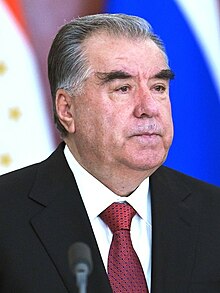His Excellency Founder of Peace and National Unity — Leader of the Nation Emomali Rahmon | |
|---|---|
| Эмомали Раҳмон | |
 Rahmon in 2023 | |
| 3rd President of Tajikistan | |
| Assumed office 16 November 1994 | |
| Prime Minister | Abdujalil Samadov Jamshed Karimov Yahyo Azimov Oqil Oqilov Kokhir Rasulzoda |
| Preceded by | Rahmon Nabiyev Akbarsho Iskandrov (Acting) |
| Leader of the People's Democratic Party | |
| Assumed office 18 March 1998 | |
| Preceded by | Abdulmajid Dostiev |
| Chairman of the Supreme Assembly of Tajikistan | |
| In office 20 November 1992 – 16 November 1994 | |
| Prime Minister | Akbar Mirzoyev Abdumalik Abdullajanov Abdujalil Samadov |
| Preceded by | Akbarsho Iskandrov |
| Succeeded by | Office abolished |
| Personal details | |
| Born | Emomali Sharipovich Rahmonov 5 October 1952 Danghara, Kulob Oblast, Tajik SSR, Soviet Union (now Tajikistan) |
| Political party | People's Democratic Party (1994–present) |
| Other political affiliations | Communist Party (1990–1994) |
| Spouse | Azizmo Asadullayeva (m. 1970s) |
| Children | 9, including Ozoda and Rustam |
| Parent(s) | Sharif Rakhmonov Mayram Sharifova |
| Alma mater | Tajik State National University |
| Signature |  |
| Military service | |
| Allegiance | |
| Branch/service | |
| Years of service |
|
| Rank | |
| ||
|---|---|---|
|
President of Tajikistan 1994-
Government
parliamentary election Family    |
||
Emomali Rahmon (Tajik: Эмомали Раҳмон; born Emomali Sharipovich Rahmonov[a], born 5 October 1952) is a Tajik politician who has served as the President of Tajikistan since 1994, having previously led the country as Chairman of the Supreme Assembly from 1992 to 1994 (the post of president was temporarily abolished during this period).
Since 18 March 1998, he has also served as the leader of the People's Democratic Party of Tajikistan, which dominates the Parliament of Tajikistan. On 30 September 1999, he was elected vice-president of the UN General Assembly for a one-year term.
He became widely known in 1992 after the abolition of the post of president in the country, when at the dawn of the civil war (1992–1997) he became Chairman of the Supreme Soviet (Parliament) of Tajikistan as a compromise candidate between communists and neo-communists on the one hand and liberal-democratic, nationalist and Islamist forces (the United Tajik Opposition) on the other.
Five times (in the elections of 1994, 1999, 2006, 2013 and 2020), Rahmon won undemocratic presidential elections; in addition, he extended and reformed his powers based on the results of the national constitutional referendums of 1999 and 2003. Since 25 December 2015, Emomali Rahmon has held the lifetime title of Peshvoyi Millat (Tajik: Пешвои Миллат), which means “Leader of the Nation”, in full — “Founder of peace and national Unity — Leader of the Nation”. Following the results of the last national constitutional referendum in 2016, amendments were adopted that lifted the restrictions on the number of re-elections to the post of President of Tajikistan and lowered the age limit for those running for the post of president from 35 to 30 years.
Rahmon heads an authoritarian regime in Tajikistan with elements of a cult of personality. Political opponents are repressed, violations of human rights and freedoms are severe, elections are not free and fair, and corruption and nepotism are rampant.[2][3][4][5] Various important government positions are occupied by his family members, such as his 36-year-old son Rustam Emomali, who is the chairman of the country's parliament and the mayor of its capital city, Dushanbe.[6][7][8]
- ^ "Эмомали Рахмон: вехи политической биографии". Asia-Plus. Asia-Plus News Agency. 5 October 2016. Archived from the original on 24 June 2016. Retrieved 20 May 2016.
- ^ "Tajikistan's eternal ruler Emomali Rakhmon". DW.COM. Deutsche Welle. 12 October 2020. Archived from the original on 6 July 2021. Retrieved 5 July 2021.
- ^ "World Report 2019: Rights Trends in Tajikistan". Human Rights Watch. 15 January 2019. Archived from the original on 24 February 2019. Retrieved 13 May 2020.
- ^ "The world's enduring dictators: Emomali Rahmon, Tajikistan". www.cbsnews.com. CBS News. 19 June 2011. Archived from the original on 9 July 2021. Retrieved 5 July 2021.
- ^ "Tajikistan: Nations in Transit 2020 Country Report". Freedom House. Archived from the original on 11 July 2021. Retrieved 5 July 2021.
- ^ Pannier, Bruce (23 August 2016). "Nepotism And Dynasty In Central Asian Politics". RadioFreeEurope/RadioLiberty. Archived from the original on 11 July 2021. Retrieved 11 July 2021.
- ^ Benevento, Chris. "Tajikistan: President's Daughter Gets Plum Ministry Job". www.occrp.org. Organized Crime and Corruption Reporting Project. Archived from the original on 11 July 2021. Retrieved 11 July 2021.
- ^ Pannier, Bruce (10 February 2018). "The Happiest Member Of The Rahmon Family". RadioFreeEurope/RadioLiberty. Archived from the original on 7 May 2021. Retrieved 11 July 2021.
Cite error: There are <ref group=lower-alpha> tags or {{efn}} templates on this page, but the references will not show without a {{reflist|group=lower-alpha}} template or {{notelist}} template (see the help page).
